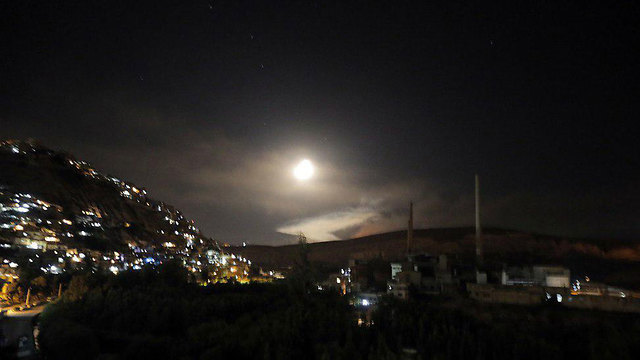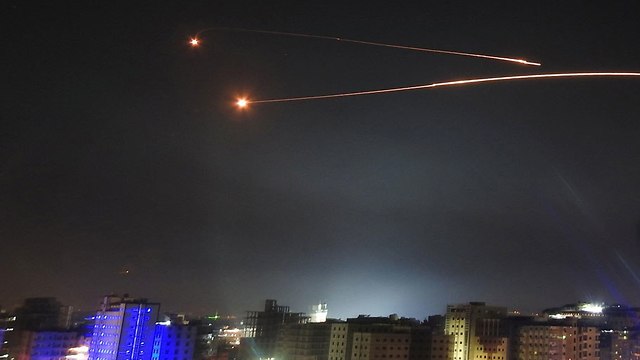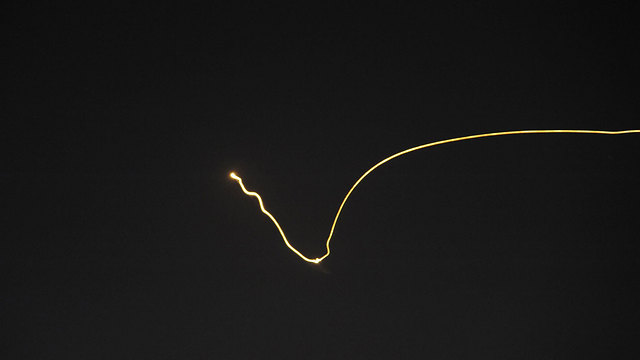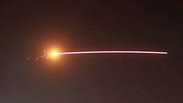
Russia says Syria shot down more than half of missiles fired by Israel
Russian defense ministry says Israeli strike on Iranian targets carried out by 28 planes that fired at least 60 missiles; Syria war monitor: Israeli strikes killed 23 fighters. Deputy Foreign Minister Mikhail Bogdanov says Russia concerned about growing military tensions between Israel and Iran over Syria, calls for them to de-escalate after recent missile strikes.
According to the report, the Israeli strike was carried out by 28 planes which fired at least 60 missiles, including 10 surface-to-surface missiles.
A Syrian war monitoring group said the attacks killed 23 fighters, including five Syrian soldiers.
The Britain-based Syrian Observatory for Human Rights says Thursday the overnight attacks struck several military posts for Syrian troops and Iranian-backed militias near the capital, Damascus, in central Syria and in southern Syria.
The head of the Observatory, Rami Abdurrahman, said five Syrian soldiers, including two officers, and 18 militia fighters were killed. Abdurrahman says it is not immediately clear if Iranians were among those killed. He said the toll was likely to rise because some of the wounded are in critical condition.
The Observatory said the strikes targeted suspected locations of the Lebanese Hezbollah group, as well as areas where Iranian advisers are believed to be based.
Meanwhile Thursday, the TASS news agency quoted Russia's Deputy Foreign Minister Mikhail Bogdanov as saying his country was concerned about growing military tensions between Israel and Iran over Syria and calling for them to de-escalate after recent missile strikes.
"This is all very alarming, it causes concern. There should be work to de-escalate the tensions," TASS quoted Bogdanov as saying.
French President Emmanuel Macron also appealed for calm.
"The president has been kept regularly updated. He calls for a de-escalation in the situation," Macron's office said in a statement.
Macron will discuss the Middle East in a meeting with German Chancellor Angela Merkel later on Thursday, the Elysee said.
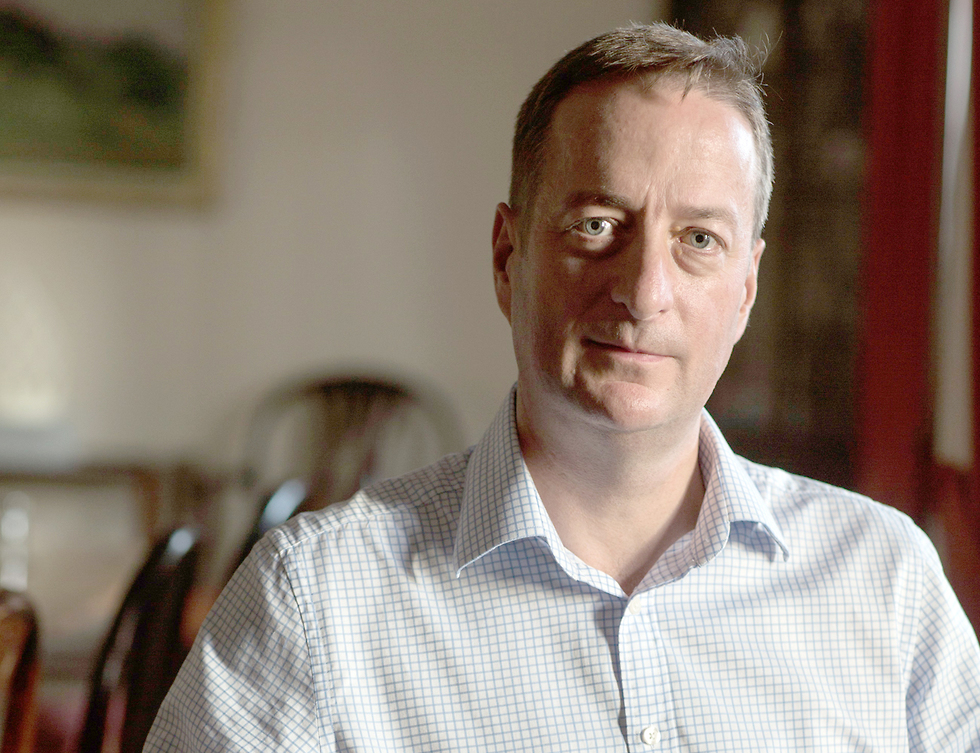
UK Ambassador to Israel David Quarrey said Thursday that his country was concerned about the escalation on Israel's northern border amid Iranian attack on Israel and the IDF's retaliation.
Querry said in a Ynet interview that he expected London to condemn the Iranian attack and to support Israel's right to defend itself, as it did after an Iranian drone infiltrated Israel in February.
Hamas issued a statement saying, "We condemn the ongoing attack on the Palestinian people and on the region's countries and the Israeli escalation against Syria. This proves that Israel is the Arab nation's main enemy and its greatest threat and is mongering terror in the region.
"Hamas stresses the Arab and Islamic countries' right to defend their lands and their right to respond with force to any act of aggression, and this requires the Arab nation to put all its energies and abilities into deterring the enemy and thwarting its plans, which are negatively affecting the Palestinian issue and the region," the Palestinian organization said.
Lieberman: We hit almost all Iranian infrastructure
Israel said it attacked nearly all of Iran's military infrastructure in Syria on Thursday after Iranian forces fired rockets at Israeli-held territory for the first time.
It was the heaviest Israeli barrage in Syria since the start in 2011 of its civil war, in which Iranians, allied Shiite militias and Russian soldiers have deployed in support of President Bashar Assad.
Defense Minister Avigdor Lieberman said the Iranian rockets either fell short of their targets, military bases in the Golan Heights, or were intercepted.
Expectations of a regional flare-up, amid warnings from Israel it was determined to prevent Iranian military entrenchment in Syria, were stoked by US President Donald Trump's announcement on Tuesday that he was withdrawing from the Iranian nuclear deal.
The Trump administration portrayed its position against that agreement as a response, in part, to Tehran's military interventions in the region—underpinning Prime Minister Benjamin Netanyahu's tough line towards Iran.
The Golan attack was "just further demonstration that the Iranian regime cannot be trusted and another good reminder that the president made the right decision to get out of the Iran deal," White House press secretary Sarah Sanders told Fox News.
Israel said 20 Iranian Grad and Fajr rockets were shot down by its Iron Dome air defence system or did not reach targets in the Golan.
The Quds Force, an external arm of Iran's Revolutionary Guards, carried out the launch, Israel said.
Syrian state media said dozens of Israeli missiles struck a radar station, Syrian air defence positions and an ammunition dump, underscoring the risks of a wider escalation involving Iran and its regional allies.
"We hit ... almost all of the Iranian infrastructure in Syria," Lieberman said, in a question and answer session at the annual Herzliya security conference in Tel Aviv. "I hope we finished this chapter and everyone got the message."
Israeli military spokesman Lieutenant-Colonel Jonathan Conricus told reporters the Iranian attack was "commanded and ordered by (Quds Force chief General) Qassem Suleimani and it has not achieved its purpose".
Conricus said Israel responded by destroying dozens of Iranian military sites in Syria, as well as Syrian anti-aircraft units that tried unsuccessfully to shoot down Israeli planes.
"We do not know yet the (Iranian) casualty count," he said.
"But I can say that in terms of our purpose, we focused less on personnel and more on capabilities and hardware ... to inflict long-term damage on the Iranian military establishment in Syria. We assess it will take substantial time to replenish."
There was no immediate comment from Iran.
In the Golan Heights, Israeli schools opened as usual on Thursday morning, after sirens sent residents to shelters during the night.
Lieberman said Israel was not seeking escalation on the Syrian front. But Tzachi Hanegbi, a cabinet minister close to Netanyahu, cautioned that more confrontation could come.
"I don't think I can tell you that one blow, as effective and crushing as the one they (the Iranians) received last night, is enough to convince a regime that is usually very fanatical and determined," he said on Israel Radio.
New front
The Israelis fear that Iran and its Lebanese ally Hezbollah are turning Syria into a new front against them. Israel says its occasional strikes in Syria aim to foil that.
Iran vowed retaliation after a suspected Israeli air strike last month killed seven of its military personnel in a Syrian air base.
Israel regards Iran as its biggest threat, and has repeatedly targeted Iranian forces and allied militia in Syria.
On Tuesday, hours after Trump's announcement on the nuclear deal, Israeli rockets targeted a military base in Kisweh, a commander in the pro-Syrian government regional alliance said.
That attack killed 15 people, including eight Iranians, the Syrian Observatory for Human Rights said, though the commander said there were no casualties. Israel has neither confirmed nor denied responsibility.
Thursday's conflagration came hours after Netanyahu returned from a visit to Moscow, where he discussed concerns about Syria with Russian President Vladimir Putin.
Netanyahu said after the discussions that Russia was unlikely to limit Israel's armed actions in Syria. The Israeli military said Israel had forewarned Russia of its strikes on Thursday.
The Associated Press contributed to this report.










